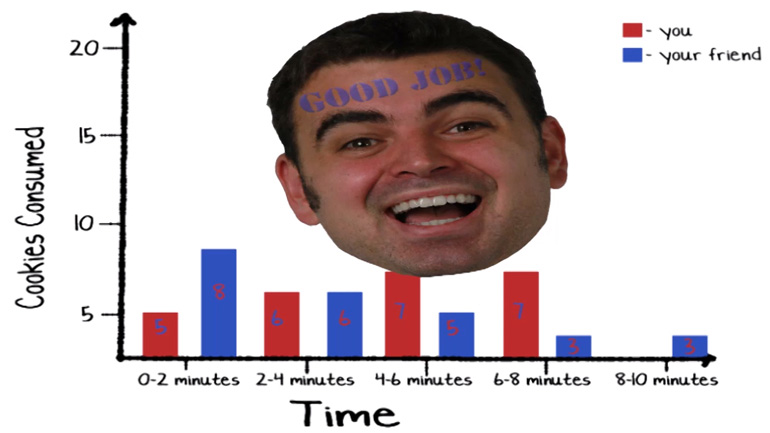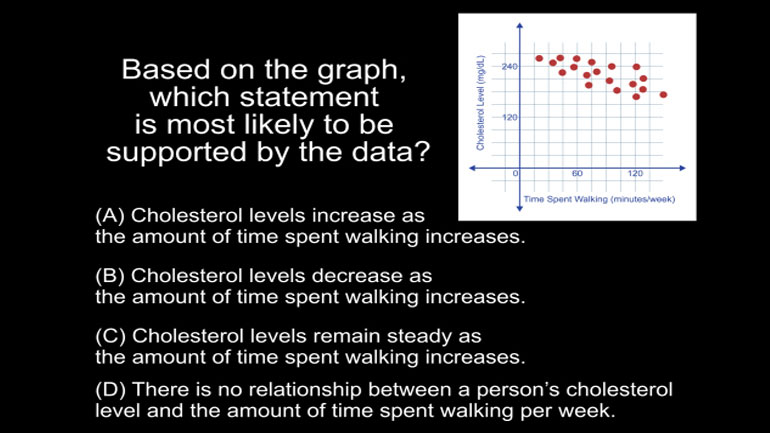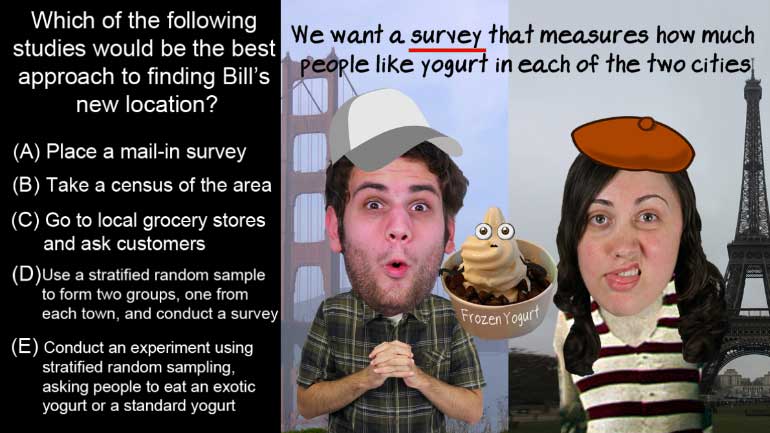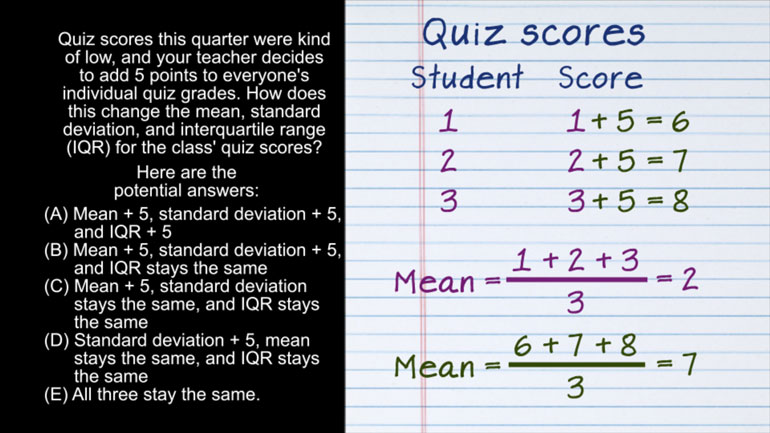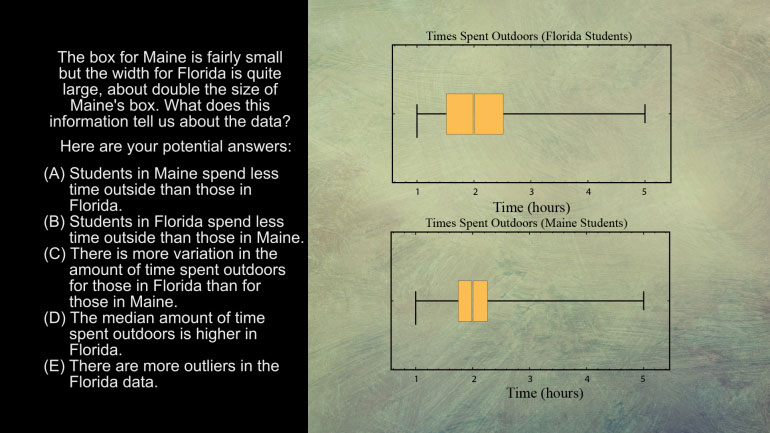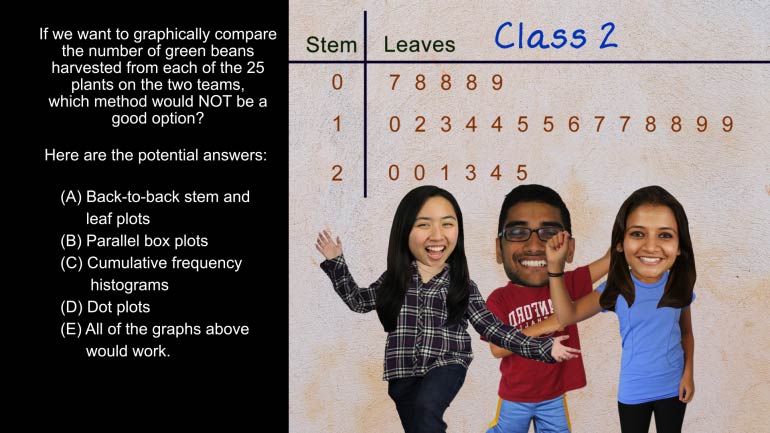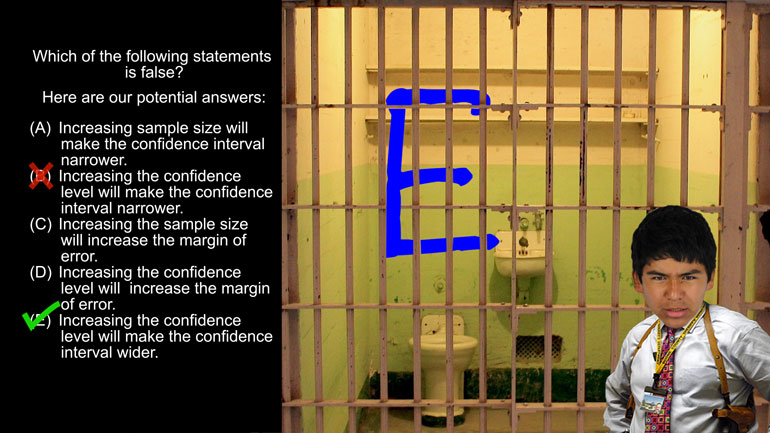ShmoopTube
Where Monty Python meets your 10th grade teacher.
Search Thousands of Shmoop Videos
Understand and evaluate random processes underlying statistical experiments Videos 5 videos
Data doesn't do us much good if we can't interpret it. Ever snuck into a CPA's office while he slips out for a coffee break and tried to decipher o...
Statistics, Data, and Probability II Drill 4 Problem 2. Based on the graph, which statement is most likely to be supported by the data?
Statistics, Data, and Probability II Drill 6 Problem 4. What conclusion can be drawn from the graph?
AP Statistics 1.2 Sampling and Experimentation 267 Views
Share It!
Description:
AP Statistics: Sampling and Experimentation Drill 1, Problem 2. Which of the following studies would be the best approach to finding his new location?
Transcript
- 00:03
Here's your AP stats shmoop du jour:
- 00:06
Bill has decided to fulfill his lifelong dream and open an exotic yogurt store.
- 00:11
He has narrowed his possible future location to one of two large cities and would like to determine the
- 00:17
location with the most yogurt fanatics.
- 00:23
Which of the following studies would be the best approach to finding his new location?
Full Transcript
- 00:28
And here are the possible answers...
- 00:35
Okay. We know, we know, before we even get to the real question, the more important question...
- 00:40
is it greek yogurt or frozen yogurt?
- 00:46
Let's just say it's frozen yogurt because everybody loves some froyo in town.
- 00:50
Back to the real question...The question asks us how Bill should measure the amount of yogurt
- 00:54
fanaticism by area. To do this, we'll want a survey that measures how much people like
- 00:59
yogurt in each of the two large cities.
- 01:05
Emphasis on the word SURVEY.
- 01:10
Since experiment E merely compares the how much people like exotic and standard yogurt by area
- 01:16
and is an experiment..not a survey,
- 01:22
we can rule out option (E) as an answer choice.
- 01:28
The question also mentions that we're dealing with two large cities...so doing any kind
- 01:33
of census where we poll every single person in the population...kind of like that government
- 01:38
population census they do every 10 years...
- 01:43
Too much money and time to do it...
- 01:45
Bill needs as much time as possible to perfect his new shnozberry yogurt recipe.
- 01:53
Therefore, we are left with three surveys: the mail-in survey, the grocery store survey,
- 01:59
and the phone survey, options A, C, and D.
- 02:02
Ok, the mail-in survey. First of all, if you
- 02:05
ever saw a survey in the newspaper...when have you ever actually filled it out and turned
- 02:10
it in? Besides...who reads newspapers anymore...
- 02:13
Honestly, the only people who will turn in the mail-in
- 02:15
survey are those feel really strongly..either positively or negatively..about establishing
- 02:21
a new yogurt store in the area.
- 02:27
Kind of like Bill.
- 02:30
This kind of bias is called self-selection bias.
- 02:32
The people being surveyed "self-select" themselves into the group that really cares
- 02:36
about froyo.
- 02:39
The local grocery store survey. Let's think about this. What if you just don't happen
- 02:44
to shop at that particular grocery store that Bill's handing out surveys?
- 02:50
Maybe you live too far, maybe you had a late night and couldn't get up to go with your parents to
- 02:54
the store...Regardless, the local grocery store surveys won't give Bill a random sample
- 02:59
of the city. It'll give him a sample of the people who happen to shop at the particular grocery store that day.
- 03:07
And finally, we're left with option D. The phone survey.
- 03:12
Oo, we like that word: random.
- 03:14
Random is usually a good indicator in stats that you're performing the right type of experiment
- 03:19
without sampling biases. The word stratified in this case
- 03:24
just means that Bill is first
- 03:26
dividing or stratifying the population into each of the two cities...and then choosing
- 03:31
random people to survey in each group. Answer's (D).
- 03:36
And since we like random things so much, we can't wait until Bill installs his new random
- 03:39
yogurt flavor-making machine. The machine will mix up to three random flavors chosen
- 03:44
from his exotic stock.
- 03:46
Watch out for the anchovy yogurt, people.
Related Videos
AP Statistics 2.1 Exploring Data. How does this change affect the mean, standard deviation, and IQR?
AP Statistics 5.1 Exploring Data. What does this information tell us about the data?
AP Statistics 5.2 Exploring Data. Which method would not be a good option?
AP Statistics 1.5 Statistical Inference. Which of the following statements is false?
Want to pull an Oliver Twist and ask us for more? We've gotcha covered. Head over to /video/subjects/math/test-prep/ap-statistics/ for more AP...
